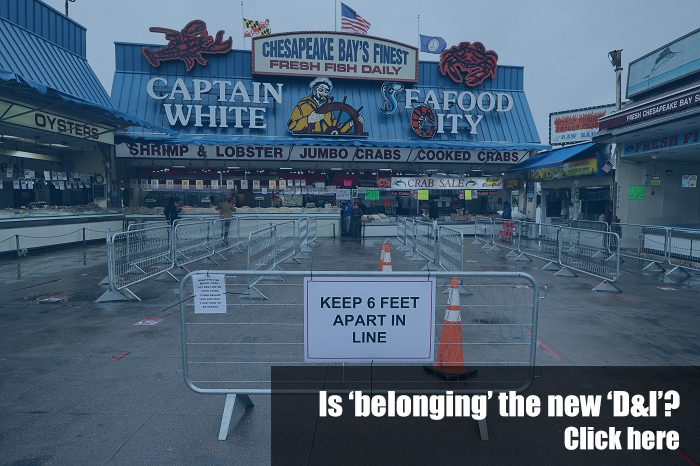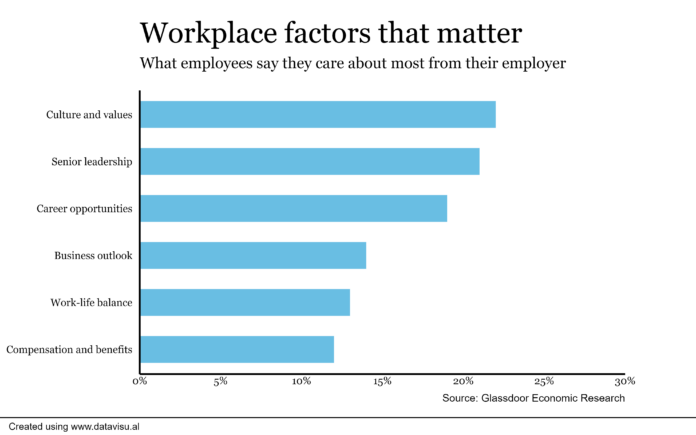Editor’s note: This is the second of a two-part series related to coronavirus around remote employee engagement and priorities for HR leaders–from HR’s top experts.
*
In her position as chief talent officer at San Jose, Calif.-based ServiceNow, Pat Wadors has traditionally opened staff meetings by giving employees the opportunity to share their personal and professional selves. Employees are free to talk about anything that’s going on in their lives–good, bad or otherwise. Family illnesses or celebrations, past experiences, stories of when they have or haven’t felt like they’ve belonged; anything employees would like to share is welcome, with the goal of “nurturing the human connection” through storytelling–a concept that has gained considerable steam as “virtual happy hours” and other connection-building exercises have risen in popularity in the current pandemic.
Read all of HRE‘s coronavirus coverage here.
“Storytelling unlocks chemicals in our brain and makes us more compassionate and more able to listen and connect to each other,” says Wadors. “The goal is to get to know the human and where they are in life. When we do, we discover we can trust each other, we can make mistakes and not feel silly, so we take more risks.”
Seeking to bring the concept to life, many companies have begun creating short online videos in which employees share stories about times when they felt they truly belonged at work. The ability to see the faces of actual employees as they talk about their real-life experiences makes belonging real in the eyes of the workforce because it is clearly “not just a message on a webpage or a word thrown in next to ‘diversity,’ ” says Stephanie Creary, assistant professor of management at the Wharton School at the University of Pennsylvania.
Believing that diversity, inclusion and belonging are at the forefront of a workplace culture where employees want to go above and beyond to give their best to the company, Pleasanton, Calif.-based Workday Inc. created a strategy called VIBE (valuing inclusion, belonging and equity for all) at Workday. The goal is to inspire employees to actively participate in building inclusion and ensuring that Workday is a “psychologically and emotionally healthy place to work,” explains Chief Diversity Officer Carin Taylor.
“When we talk about belonging, we work to create an environment where there is psychological safety, trust, empathy and openness for everyone,” says Taylor. “When employees feel like they belong, they are able to bring their best selves to work.”
In 2019, the company hosted its first VIBE Week, featuring speakers, learnings and social gatherings across 34 Workday global locations to “get everyone rallying around how we value inclusion, belonging and equity for all, says Taylor. Workday’s focus on belonging has helped its leaders build on their diversity practices, particularly through the results of the company’s Belonging Index, which includes questions from the Best Workday survey pertaining to belonging. Insights from the index are used to determine where more education or programs are needed.
“When leaders notice there are discrepancies related to belonging and inclusion on their teams, they have responded by running a workshop tailored to those specific needs,” says Taylor. “These include building trust, strengthening relationships, understanding how bias impacts teams and/or creating strategies for building more diverse teams.”
While commitment from leadership is crucial, Taylor is quick to note that employees are also expected to “take personal accountability to create a culture of VIBE.” That theme is woven throughout companies that have embraced the concept of belonging. As Wadors explains, “you don’t need permission to unlock respect and care and compassion.”
“You can give [colleagues] micro-moments a thousand times a day,” she says.
In recent years, cultivating a sense of belonging has been increasingly complicated by social unrest and a contentious political environment, says Louis Montgomery, Jr., practice leader, human resources and diversity officers practices at Korn Ferry in Reston, Va.
“There are all kinds of issues out there that when and if discussed–and they are frequently discussed at work–could make things more challenging in terms of people feeling connected to the organization,” he explains. “The polarization and political talk can have a negative impact around belonging.”
Discussions around police shootings of unarmed black men, a deeply divided electorate, hate crimes and other outside factors often serve as impediments to belonging, as employees may feel wary of being around colleagues who view contentious issues differently than they do, says Laura Sherbin, managing director of New York-based Culture@Work.
All too often, that causes conversation to stop because people don’t feel safe talking about the issue–and, no doubt, as workers eventually head back to offices, differing views on the coronavirus pandemic and how employers or elected officials handled the situation will crop up.
“The voice track that begins happening in your head is one of incredible isolation that ‘I’m the only person that’s bothered by this’ or ‘I’m not safe around certain colleagues and certain demographics because there is so much hate,’ ” says Sherbin.
Rather than allowing an environment to fester in which employees clam up and feel increasingly isolated, Creary recommends organizations encourage workers to follow their hearts and provide opportunities for them to “express the self” by dialoging about outside events that are affecting or concerning them.
“Employees have the need to express their feeling about what’s happening outside of work,” says Creary. “This is a critical component of moving towards a sense of belonging where it’s not just about the tasks I do and my expertise, it’s also about me as a human and that is valued here as well.”
*
For more part one on organizations are increasingly looking to foster a sense of belonging, click here.



